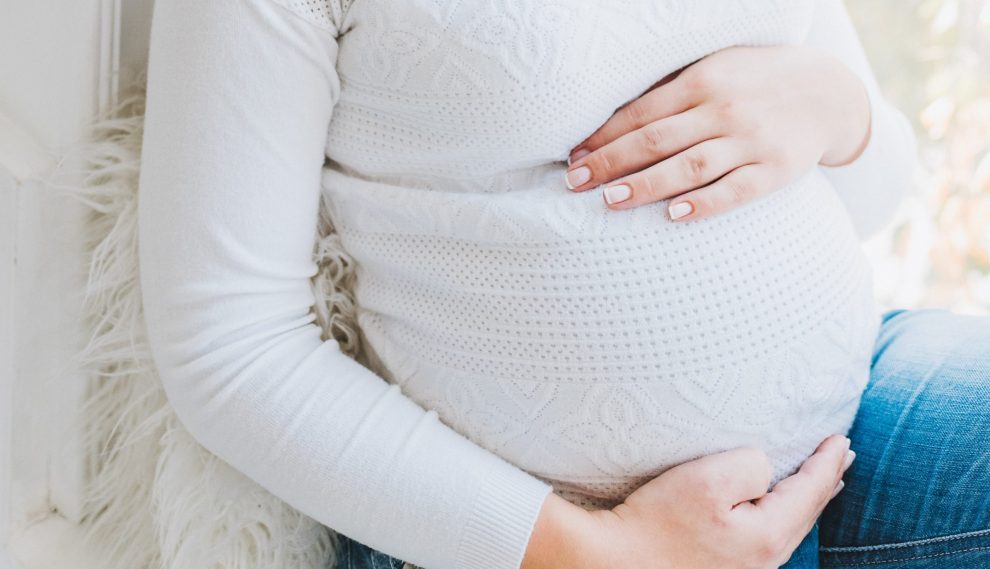For the first seven months of pregnancy, I made the same comment during every doctor’s visit: “I just want a boring pregnancy.”
The youngest of four children with several nieces and nephews, I grew up hearing stories about childbirth—from the uneventful to the near-cataclysmic. Because of these stories, I’ve always had a respectful fear of pregnancy and childbirth and the pain and dangers that can come along with them.
It was with shock I realized in mid-March that my wished for “boring” pregnancy was no longer going to happen. Thanks to the novel coronavirus pandemic, I’ve been wrestling for the past few months with a string of anxieties I never could have predicted—questions about how to find supplies without leaving my home, how to stay healthy, and when and how my husband and I will be able to safely introduce our daughter to family and friends.
I am not alone in my anxiety. Across the country, new mothers are scrambling to plan for the unpredictable during an unprecedented health crisis. For many of us, this means giving up on hopes and dreams for what a much-anticipated pregnancy would be like.
Joelle Mendoza Purdy, of Washington, D.C., is due in late August with her second child. Keeping in mind CDC guidelines, which suggest pregnant women may have a higher risk of infection by COVID-19, she tries to avoid leaving her home whenever possible, even to go to the grocery store. She recently began a new job as a social worker in an intensive care unit, and she’s grateful that she has been able to complete much of her new employee orientation from home.
“I’m definitely more hyperaware of what’s happening, because pregnancy adds another layer,” Purdy says. “My husband and I wouldn’t want to get coronavirus if we were both healthy, but it definitely feels like there’s an additional risk now.”
Brianne Woodworth of Chicago, due in June with her first child, says her biggest struggle related to the coronavirus is less contact with her doctor. Many medical practices are cutting down on non-emergency appointments or switching to telehealth appointments. Recently diagnosed with gestational diabetes, Woodworth says it’s difficult to come to terms with the diagnosis and the required lifestyle changes while not being able to interact with her case manager, nutritionist, and OB-GYN in person.
In the early days of Chicago’s stay-at-home order, when people were rushing to the grocery store at a higher rate, it was also stressful for Woodworth to find the specific foods she needs. “There’s so much to think about to make sure I’m getting enough carbs but not overdoing it to keep my blood sugar levels at or below the threshold,” she says. “So while I have access to those foods, I have less latitude and choice.”
Nina Fernando, who is due to give birth in August, has concerns about what her childbirth experience will be like. To limit possible novel coronavirus exposures, hospitals around the country have placed strict restrictions on women giving birth, usually limiting visitors to one person. While she has always envisioned having her mother, sister, and a doula by her side during delivery, she now expects it will be only her and her husband.
Another fear is what might happen if she tests positive for COVID-19. While CDC recommendations show that mother-to-child transmission of coronavirus during pregnancy is unlikely, there is little data on how vulnerable newborns are to the illness. Some hospitals and birthing centers are requiring sick mothers to be separated from their own children after birth.
“My hope is that in this process of childbirth, I will be taken into consideration and that my opinions will matter and be heard,” Fernando says. “Sometimes I think in the health care setting, the focus may be just about getting the baby out. I really hope and pray for an experience that’s more holistic.”
Apart from medical concerns, there are also emotional factors to being pregnant during a pandemic. Social distancing requirements keep many pregnant women away from their family and friends during what would otherwise be a celebratory time. It’s not the same experience sharing bump photos over social media and text messages. Many women have to skip pre-baby traditions like baby showers, opting for virtual meetups instead.
Fernando and her husband planned to relocate from Washington, D.C. to California this summer to be closer to their families. With the pandemic in mind, they pushed their move up so they will be settled in case the situation worsens.
“There’s so much we didn’t know and still don’t know,” she says. “We’re using technology more and more to stay connected with our loved ones, but I hope we can be together in the same place and pass around the baby. That’s my dream.”
That isolation is also being felt by mothers of infants. Bridget Edmonds, of Denver, Colorado is the mother of a 4-month-old son. Her time in quarantine began immediately after her maternity leave ended, when the school where she teaches shifted to online learning. Since then, Edmonds has had to learn how to juggle working full-time as an online educator while also caring for an infant.
While living in quarantine can feel similar to the early days of her maternity leave, Edmonds says she feels more trapped because she and her husband aren’t leaving the house or seeing friends and family.
“I FaceTime my parents everyday so they get to see him in that way, but he’s just this pudgy little baby who loves to cuddle and it breaks my heart that they don’t get to experience that sweetness in person,” Edmonds says. “This is such a special time because everything changes so quickly in terms of the baby’s personality, which develops over weeks or sometimes days. It hurts me when they miss out on that.”
To cope with the sudden changes, many new mothers say their faith brings comfort and peace. For Edmonds and her husband, that means taking advantage of virtual conversations and livestreams with their church community. They’re also trying to incorporate prayer into their baby’s daily routine.
“We’re constantly praying for people we know who are affected by this and also praying for whatever purpose God has for us at this time,” she says. “The impacts of COVID-19 are shaking the shakable things in our life, like the economy and our daily comforts and these very worldly things that we tend to wrongly find our stability in. While all these shakeable things are shaking, God is not. He is present and constant and that has been a great source of joy and comfort for us.”
Ruth Chiappinelli, of Burlington, Vermont, is due with her first child in August. She says her faith helps her keep a healthy perspective.
“My mom said to me when I was first pregnant that, ‘Now you’re a mother, so you’re always going to worry,’” Chiappinelli says. “What I’ve tried to tell myself so far is that anxiety is going to find you no matter what, especially in times like these, so you shouldn’t try to look for things to be anxious about.”
Rather than giving into fear, Chiappinelli says she’s able to find silver linings in the situation, like being able to spend more time with her husband and having more time to prepare their nursery.
“I’ve enjoyed the fact that when so much is going on in my body, life has slowed down in an interesting way,” she says.
As for myself, I’ve been reflecting on the words of Pope Francis during a Mass earlier this month. Speaking for pregnant mothers fearful of the world their children are inheriting, he prayed, “May the Lord give them the courage and confidence that it will certainly be a different world, but also one that the Lord will love tremendously.”
As I finish up my 37th week of pregnancy, I find comfort in knowing I’m part of a new community of expecting mothers around the world. Though our pregnancies are far from “boring,” we are facing a unique set of circumstances together. Our children will face a different kind of world — one filled with hand sanitizer and face masks, but also love.
Image: by Anastasiia Chepinska on Unsplash














Add comment